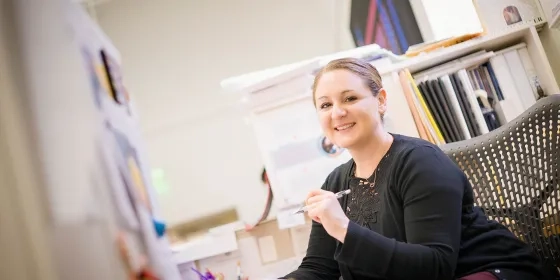Alyssa Stone ’09
“I started performing when I was seven years old.” This is the sort of statement one might expect to hear from a child reared on music, but coming from SFCM alumna Alyssa Stone ’09, it serves as confirmation of her passion for performance and the importance of music in a child’s life.
An Oakland, California native, Stone immersed herself in musical theatre from an early age, taking seemingly every opportunity to perform throughout middle school and high school and studying classical voice at the same time. When it came time to attend college, she decided to study voice at Illinois Wesleyan University. The small school atmosphere allowed her the freedom to pursue a unique course of study, one that complemented her wish to combine programmatic storytelling with performance. At New England Conservatory, where she earned her master’s degree, she focused on art song rather than opera, leaning toward a path that offered her a chance to hone her sense of programming.
“I was crafting performances from scratch,” says Stone. “I wasn’t performing a piece of opera, I wasn’t just performing in a recital setting—I was developing a theme and creating an entire concert around that theme.”
This is Stone’s forte. Her desire to bring in the facets of artistic administration, education, and performance is a sort of professional gesamtkunstwerk, the complete package of what she feels is the perfect recipe for educational initiatives in music.
While in Boston, a part of Stone was longing for the Bay Area. A move back to San Francisco after attending New England Conservatory offered her a unique opportunity to network and stretch her own artistic initiatives.
At SFCM, Stone bloomed, especially, under the mentorship of Catherine Cook. Teachers and coaches welcoming her interest in programming, collaborating with different departments—it was an all-inclusive educational bundle that got her on the path she always wanted to travel.
“What was so thrilling to me was that there was so much encouragement to pair up with other musicians in other departments to perform,” Stone remarks. “I got to work with guitarists, percussionists, chamber ensembles….I got to work with all these different musicians way outside the voice genre to craft a performance, and I just loved that.
“SFCM never looked down on the other art forms, and I think it’s so special and really, really validating for young artists coming from varied backgrounds who are discovering their voices at a very young age that none of the other genres are off the table.”
It’s her passion for developing the talents of young artists that has led Stone down her career path. Her passion for performance and programming manifests fully in her interest in arts administration, an industry in which she’s been professionally involved for a decade now.
“I started interning at San Francisco Opera while I was studying at the Conservatory, which is how I made that leap into arts administration,” she says. Taking advantage of SFCM’s professional relationships with organizations around the Bay Area, Stone was able to move swiftly into the field she wanted to be a part of.
“Deep down, I knew I wasn’t going to have a full-on career as a performer,” she says. “I always wanted to teach and be an arts educator and work in that field.”
Since 2008, Stone has worked in arts education and administration for a slew of organizations including the San Francisco Opera, San Francisco Arts Commission, Stern Grove Festival, Seattle Opera, and Seattle Symphony. Having worked continuously for San Francisco Opera for 10 years, her position as a “teaching artist” offers her the opportunity to perform locally while also developing curriculum and outreach programs for the organization’s education department.
“One of the things that I find is special about all these programs [at different organizations], and San Francisco Opera in particular, is that I have the opportunity to create programming that allows communities—family units, specifically—to actually explore stories together and create something in a unique and interesting way that they wouldn’t have otherwise done,” says Stone. “These are programs where the adult and child are actually working and creating together side-by-side, so that when they go back home, they can keep exploring, keep building, keep discovering together.”
One of the program’s Stone started at San Francisco Opera was the First Act early childhood program. While many educational programs for children in music and the arts begin at age seven, First Act is specifically for children ages six and younger.
“It gives children a chance to explore the creative arc in a way that is accessible, tangible, fun, and replicable. All the activities we do are based on motor skills development, language acquisition, mathematics, and social emotional learning, and we just happen to utilize the opera stories, the music, as the channel through which we do these different activities that are developmentally sound.
“We’re not just playing hopscotch, we’re playing hopscotch through the trials of fire and water that Tamino and Pamina go through in The Magic Flute.”
With a host of other initiatives developed and implemented under her belt, Stone feels that the barrier to education is a phantom easily overcome with a can-do attitude and dedication to keeping music alive in the daily lives of everyone. She is eager to work with other like-minded individuals—she keeps the door open for others like her who wish to empower music through education and vice versa.
“We welcome SFCM interns all year round, and an internship is by far the best way to get a firsthand understanding of what it’s like to build a career in the arts, not just a career in performance.”
